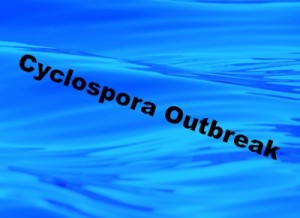Two months ago, the Centers for Disease Control and Prevention (CDC) was notified of two non-travel related cases of Cyclospora infection in Iowa. Since that time, an outbreak has mushroomed to include more than 600 cases in 22 states and spawned and investigation that includes dozens of state, local and federal health officials.
 One of them is Dr. Barabra Herwaldt, a medical epidemiologist in the parasitic disease branch at the CDC and the agency’s resident expert on Cyclospora. She discussed the challenges of the investigation in an interview with Food Poisoning Bulletin.
One of them is Dr. Barabra Herwaldt, a medical epidemiologist in the parasitic disease branch at the CDC and the agency’s resident expert on Cyclospora. She discussed the challenges of the investigation in an interview with Food Poisoning Bulletin.
One of the key ways that this investigation differs from other high-profile food poisoning outbreaks is that genetic testing technology is available for infections caused by bacteria such as E.coli, Salmonella, Listeria and Campylobacter, but not for Cyclospora, which is a parasite. “We don’t yet have DNA fingerprinting tools for Cyclospora,” said Herwaldt. “We wish we did and it’s a priority, but they’re not available yet.”
Without that technology, investigators rely on information gathered from interviews with patients and from traceback investigations of possible food sources. One such traceback investigation led the U.S. Food and Drug Administration (FDA) to the only major break in the investigation so far. After health officials in Iowa and Nebraska announced that Cyclospora illnesses in those states were linked to tainted salad mix, the FDA traced the supply line of that mix to Taylor Farms of Mexico.
Since that time, outbreak updates from the CDC have been careful to say that Iowa and Nebraska “performed investigations within their states and concluded that restaurant-associated cases of Cyclospora infection in their states were linked to a salad mix.” And “It is not yet clear whether the ill persons from all of the states are part of the same outbreak.”
That language has caused some in the industry to speculate whether the CDC has some doubts about the conclusions drawn by state health officials in Iowa and Nebraska. “It’s not casting doubt on the restaurant-associated cases in Iowa and Nebraska, but rather it’s our experience that we can have situations where there are different outbreaks from different food sources,” said Herwaldt.
For example, in 1997, more than 1,300 people contracted Cyclospora infections between March and July. Those illnesses were found to be from three separate outbreaks, with three different food sources (mesclun, raspberries and basil) from different countries. And that may be the case with this outbreak, said Herwaldt. “We are still investigating. It may be that different foods caused outbreaks in different areas.”
As for the next big break in the investigation, it could come from Texas, which has more cases than any other state. A team of CDC researchers who were collaborating with Texas health officials has recently returned to CDC headquarters in Atlanta with data that is being analyzed. Though some aren’t waiting for official results.
The first Cyclospora lawsuit in Texas was filed this week against Taylor Farms of Mexico, Bob’s Taco Station, and Max Luna Produce. According to a press release issued by the law firm, Texas has more than 300 confirmed cases of Cyclospora infection. The CDC’s most recent update lists that state’s total as 257.
The CDC has been updating case counts by state on a daily basis. These increases reflect the number of newly confirmed cases, not necessarily newly sickened patients. So far, the latest date of onset of illness to be reported is July 31, Herwaldt said, and that could mean the outbreaks are drawing to a close.
But that doesn’t mean the investigation, or the work to demystify Cyclospora is over, she said. “This parasite poses some significant challenges, but we are up to those challenges. We want to prevent outbreaks from ever happening again. This is not an academic exercise.”




